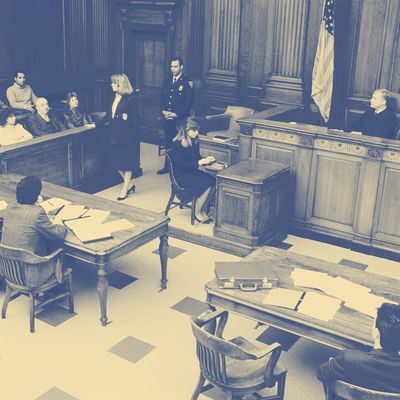
It’s well-documented, by now, that there’s a lot of racial bias in the criminal justice system. The system is massive and messy, so the specifics vary, but overall, black (and Latino) suspects and defendants deal with more zealous prosecution and longer sentences than their white counterparts, even for similar crimes.
As evidence of this has piled up, so too have ideas about how to fix it. An interesting one was recently published in the journal Behavioral Science & Policy. There, authors Sunita Sah, Christopher T. Robertson, and Shima B. Baughman, argue for a system in which prosecutors aren’t even aware of the race of the person they are prosecuting.
Why focus on this? The logic, as Sah and her colleagues lay it out, is straightforward: Prosecutors hold a huge amount of power. In addition to deciding “whether to initiate criminal proceedings, what charges to file or bring before a grand jury, how and when to prosecute individuals, and what penalties to seek,” they also have power after plea-bargaining, which is how 95 percent of all criminal cases resolve themselves. Then, they “can defer prosecution, suspend a sentence, minimize factual allegations in ways that virtually guarantee a light sentence, or insist on the most severe penalties.” So if you could only attempt to change one person’s behavior in the whole process of someone getting arrested, charged with a crime, and (in many cases) convicted and sentenced, a prosecutor would be a ripe target.
But that targeting is easier said than done. “There presently is no complete solution to eliminate racial bias in prosecutorial decisions,” the authors write, given that we’re a long way from fully disentangling how bias works. That’s why they advocate for this approach, which doesn’t seek to take bias out of the equation, but to mitigate the effects.
One interesting parallel jumps to mind: In 2000, Claudia Goldin of Harvard and Cecilia Rouse of Princeton ran a study on orchestras that adopted “blind” audition practices — those picking new musicians could hear but not see them — one of the goals being to reduce sexism in auditions, given that men were more likely to be tied into the social networks that led to auditions and jobs. They found that the blind-audition practice did appear to cut into the gender gap. It didn’t make heads of orchestras less sexist, but it prevented that sexism from infecting the hiring practice.
Sah and her co-authors are open about the fact that, practically speaking, blinding prosecutors to defendants’ races won’t be easy. Still, it’s an appealing idea because of the way it circumvents the much longer, more complicated — and still largely mysterious — process of reducing bias at the individual level.




